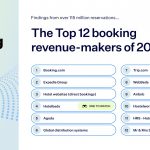Hotel market segmentation is a strategy used to identify key customer segments in a hotel.
NB: This is an article from SiteMinder
Hotel market segments rely on guest data and offer a structured view, with an opportunity to slice and look at the data in different ways. When used appropriately, it empowers decision-makers in hotels to target specific market segments with individual strategies, from marketing to pricing.
Subscribe to our weekly newsletter and stay up to date
Hotels collect a lot of guest information during the booking process and stay. While not all the information is consistent across all channels (for example, direct reservations may carry fields of data OTAs do not provide), making sense of consistent data components is required to successfully understand your own hotel’s market segmentation. It is a crucial step in applying this data for the benefit of the hotel’s business. For example, when you identify the market segment that offers your hotel the longest stays you can focus on this segment to drive up the average length of stay in your property. This may be a goal if reducing housekeeping costs for turning over rooms is on your agenda.
An additional step is understanding the market segmentation of your local market: knowing what travellers are already staying in your market sets the tone for establishing fair share and fuels meaningful comparisons as well as realistic outlooks.
Hotel market segment examples
There are no rules as to how you choose to segment the market for your hotel in your individual analysis, however there are recurring themes across hotel data providers and revenue tools that are useful to understand.
STR: The global supplier of weekly benchmarking data to the hotel industry also provides market segmentation insights divided into three segments. Transient (including most retail, discounted and negotiated rates), group and contracted business are separated by their reporting guidelines.Revenue tools: Depending on individual setups, most revenue tools use rate categories from your PMS to group reservations into market segments including group, retail, discount, negotiated, wholesale and other. They may also group by channel to provide segmentation.
When in doubt about how a data provider or tool defines a certain market segment, or what data they count in or out, it is best to review their guidelines or ask. This way, you always know how to accurately interpret hotel market segmentation provided to you by outside sources.
Meanwhile, existing reporting structures should not limit you in your own approach to successful hotel segmentation. Useful segments for your property may include but are not limited to:
Length of stayDay of weekSource market (which may be different from a traveller’s nationality)Leisure and business travel
Your data likely will lead the way once you identify what information is available for all, or the majority of your guests, and where the biggest differences or commonalities occur. For meaningful internal comparisons, compare results year over year or, for seasonal impacts, your low season with your high season.
Read rest of the article at SiteMinder
The post Why Is Market Segmentation Important For Your Hotel? appeared first on Revenue Hub.
































